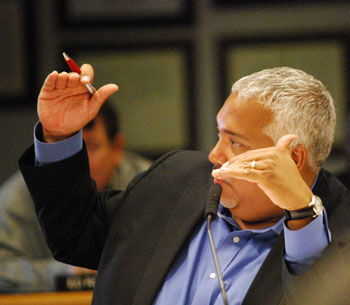Transit Board Acts on Policy, Infrastructure
Ann Arbor Area Transportation Authority board meeting (April 17, 2014): The board had two voting items on its agenda: a policy on determining disproportionate impacts of fare and service changes on disadvantaged populations; and a contract for small concrete work associated with pads for bus stops, approach walks and ramps. Both items were approved.

Ann Arbor Area Transportation Authority board member Eric Mahler was discussing the potential for disparate impacts on different populations as a result of service changes. (Photos by the writer.)
The issue of the May 6 millage vote came up during public commentary. In addition, CEO Michael Ford delivered some prepared remarks meant to dispel what he called myths about the AAATA that are being promoted by opponents of that millage. [.pdf of press release from opposition campaign]
One myth is that the AAATA is inefficient, Ford said, when in fact the AAATA has 17% lower cost per passenger and has 18% fewer employees per passenger than its peers. Another myth, Ford said, is that the AAATA has 52 managers. “It’s just simply not true,” he said. Ford explained that the AAATA has 52 employees who are non-union – 11 of whom are managers. That includes administrative assistants, IT staff, customer service, human resources, safety and security personnel, dispatchers and others, Ford said.
The assertion that the AAATA will use millage revenue to fund a train service is untrue as well, Ford continued. The AAATA had intentionally not put rail service in the ballot language. AAATA has been acknowledged in USA Today, by CNN, and by independent transportation associations as one of the nation’s best-in-class in terms of ridership, operational efficiency, fiscal stability, and technological innovation, Ford said. And that’s why he was hopeful that voters in Ann Arbor, Ypsilanti and Ypsilanti Township would say yes when they go to the polls on May 6.
The concrete work contract was awarded to Saladino Construction, for a one-year period and the possibility of four one-year renewals. Board members subjected the item to a relatively lengthy discussion as far as AAATA board discussions go – as they had questions about the amount of future work there would be, how workmanship is verified, and how pedestrian flow at bus stops is maintained during the work period.
Also given a fair amount of discussion was the policy on service equity required under Title VI. Board members had several questions, including one about the action that is required if a disparate impact on low-income riders is found as a result of a fare increase. AAATA staff stressed that there is not currently a fare increase on the table. [Full Story]



